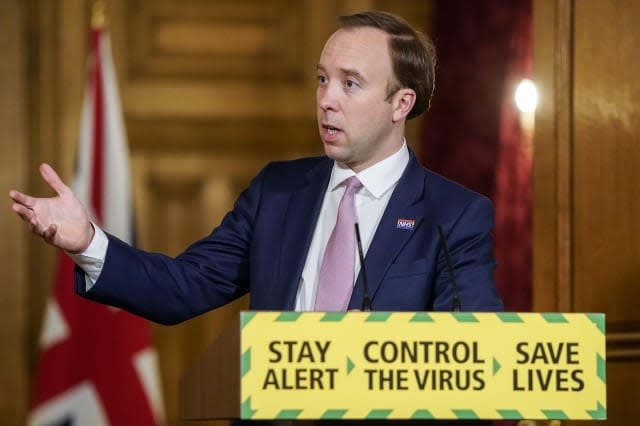Shielding to stop at the end of July, Matt Hancock says

The 2.2 million people in England who are currently shielding can meet in groups from July 6, the Health Secretary has said – with shielding coming to a stop at the end of July.
Matt Hancock said shielding had been "incredibly tough" as he set out how those who have been in the most vulnerable category will be able to meet in groups of up to six people outdoors, and some can form a "support bubble" with another household.
Food and support packages for those who have been shielding will stop at the end of July.
The new guidance says that from July 6, those shielding from coronavirus can meet with people outside of their household outdoors in groups of six – as long as social distancing is maintained.
People who are shielding and live alone, or are single parents with children, will also be able to create a "support bubble" with one other household of any size, in line with rules already in place for the wider population.
Support packages will stop at the end of July, but people will retain their priority for supermarket delivery slots, and can still access help with shopping, medication, phone calls and transport to medical appointments, according to the Department for Health and Social Care.
Those who need to work and cannot do so from home will also be able to return to work, as long as their workplace is Covid-secure.
Statutory sick pay will end at the end of July.

Mr Hancock said shielding was being "paused", and would be brought back for some groups if necessary.
"I know this has been incredibly tough," he said. "Shielding has involved not leaving your house for months, not seeing people you care about, not being able to wander to the park for some fresh air, or even pop to the shops for something you need.
"This sacrifice has been for a purpose, and I want to thank every single one of you.
"We knew it was a difficult ask, but these measures have been vital in saving lives.
"Now, with infection rates continuing to fall in our communities, our medical experts have advised that we can now ease some of these measures, while keeping people safe."
England's deputy chief medical officer Dr Jenny Harries said she understood some people would be "fearful", but perhaps needed "to push a little bit as well" to get back out, including possibly to work.
"The prevalence of the virus in the community is now lower and chances of getting infected are reduced, so we believe it is the right time to relax some of the advice so people can start to regain a degree of normality once more in their daily lives," she added.

"People should continue to follow social distancing guidance when outside their homes, as well as frequently washing their hands, to minimise the risk of becoming infected.
"We will continue to monitor the evidence closely and adjust the advice accordingly if there are any changes in the rates of infection that could impact on this group."
She said there was possibility of a "slight seasonal effect" which is helping lower the infection rate but said the move was not entirely risk-free.
The Office for National Statistics (ONS) estimates that fewer than one in 1,700 people in in the community have coronavirus, down from around one in 500 a month ago.
The Department of Health said those who have shielded should still continue to remain at home when possible, wash their hands and limit contact with too many other people.
Niall Dickson, chief executive of the NHS Confederation – which represents organisations across the healthcare sector, said: "Shielding has not been without risk to these people's physical and mental health.
"But it will be important for them and everyone else that they continue to exercise caution, and that the whole country continues to observe the recommended social distancing, face mask wearing, and other measures to protect this population as shielding restrictions ease.
"It will also be critical to ensure the rapid strengthening of the Test and Trace service, which is our frontline defence against the virus.
"The risk of a second surge is not over and we have seen elsewhere that the virus can return.
"So, while we understand and support measures to move back to a more normal existence, the watchwords for now must be eternal vigilance.
"The shielded population may be out of their homes but they are not out of the woods."

Chris Askew, chief executive officer at Diabetes UK, said: "The Government has again given little to no acknowledgement of the impact that these changes will have on thousands of people living with conditions such as diabetes, or detailed the support and protections they can expect.
"Thousands of people with diabetes are telling us that social distancing at work is not being made possible, and that employers' risk assessments are failing to protect them.
"Without more robust guidance, employers will continue to decide their own 'acceptable risk' with no safeguards for individual staff, or consequences for non-compliance.
"The Government must do more, and take this opportunity to present clear and extensive guidance so that the people who it aims to protect have explicit and robust protections at work."
Genevieve Edwards, chief executive of Bowel Cancer UK, said the new guidance would cause anxiety for some, particularly about returning to work.
She added: "This may involve the need to travel on public transport and to mix more frequently with others, leaving workers forced to choose between their work and their health."
She said employers must still enable people to work from home where possible.


